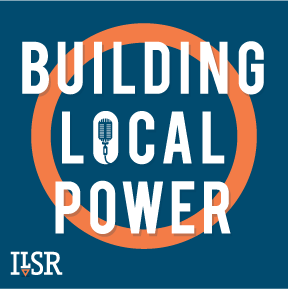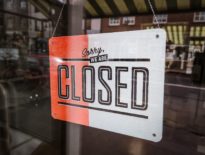Podcast (buildinglocalpower): Play in new window | Download | Embed Subscribe: RSS
This special episode of Building Local Power features a timely conversation between Stacy Mitchell, Co-Director of ILSR, and small business owner Sandy Grodin. Sandy owns El Paso Office Products in El Paso, Texas. He’s been in the business for more than 30 years, but his company is now on the verge of collapse due to the impact of the coronavirus pandemic. He’s shutting down for three weeks, and, like many other small business owners, isn’t sure when or if he’ll be able to reopen. Stacy and Sandy discuss:
- What he and other small business owners are doing to try and maintain payroll and benefits for employees.
- The barriers he’s running into as he looks for support to keep his business afloat.
- Why ILSR is advocating for an aggressive plan from the federal government that will immediately put cash in the hands of small businesses.
“There is no, literally, no business activity coming in online or by the phone. Most of my customers, most of that business, comes from the public sector, specifically the education sector, and all of that sector literally came to a standing halt. My transactional business literally went from one day very, very active and busy, the next day none, it’s extraordinary.”
| Stacy Mitchell: | Hello and welcome to Building Local Power. I’m Stacy Mitchell, co-director of the Institute for Local Self Reliance. Today we have a special episode for you. It’s an interview with a small business owner in El Paso, Texas. With the Corona virus many small businesses have been forced to shut their doors. Many only have enough cash reserves to last for a few weeks. ILSR, together with our allies, we are pushing Congress to step in and provide grants and subsidies to cover small businesses core costs during this crisis, including their costs for payroll and rent. We think that’s a better solution than having a surge of people hit the unemployment rolls and potentially losing millions of small businesses across the country. |
| Stacy Mitchell: | There are a couple of proposals in Congress that are gaining traction to do this. If you’d like to learn more about that fight and get involved, please go to ilsr.org and click on the independent business section. |
| Stacy Mitchell: | The interview you’re about to hear will give you a sense of why these subsidies and grants are so crucial right now. Sandy Growdon owns El Paso office products in El Paso, Texas. He’s been in business for 33 years and has 17 employees. Many of his customers are institutions like public school districts and universities. And of course they’re all shut down right now. So his revenue has dropped to zero. |
| Stacy Mitchell: | In this interview you’ll hear a little bit about decisions that he’s faced with. Why alone, through the small business administration is unlikely to help his situation, what he’s doing day to day and why this crisis is really unprecedented. It’s not like past recessions or the financial crisis. It’s something that he and other small business owners have never experienced and it’s incredibly difficult to figure out how to get through. So here’s Sandy Grodin. |
| Stacy Mitchell: | Well Sandy, welcome to Building Local Power. You and I, when we originally set up this interview for our podcast, we were going to talk about Amazon, which is making in-roads trying to go after some of the public sector procurement contracts. And you’ve been an advocate against that and we may have some time to talk about that at the end. I would still like to. |
| Stacy Mitchell: | But we’ve obviously have moved into really critical situations for small businesses with everyone practicing social distancing and in some cases being told to stay home. And in some cities we’ve got businesses under a legal order to close and so on. We have never seen anything like this in terms of what the free-fall in revenue that’s happened for small business owners. So tell us a little bit about what you’re experiencing as this crisis unfolds. |
| Sandy Grodin: | What we’re experiencing, Stacy, is basically what everybody else’s experiencing. It came on so fast trying to adjust our businesses to take on this extraordinary onslaught is very, very difficult. Some decisions have to be made quickly, can’t be put off. None of us know how long it’s going to last, but we have to make decisions off the cuff. And I’ve done that in a matter of days, maybe 48 hours. |
| Sandy Grodin: | The decisions been made to first keep my sales team out for the customer space, for all the obvious reasons, just insane. There is no, literally, no business activity coming in online or by the phone. Most of my customers, most of that business, comes from the public sector, specifically the education sector and all of that sector literally came to a standing halt and my transactional business literally went from one day very, very active and busy the next day none, it’s extraordinary. |
| Sandy Grodin: | So the end result, the decision has been tough. I have unfortunately had to notify my employees. We are shutting down the business for a period of three weeks, which is the amount of time the education sector is also shut down. Hopefully they will come back online and we will be back in business again. |
| Sandy Grodin: | I’m doing all I can to maintain a payroll. I cannot guarantee the payroll beyond the end of this month. I have reached out to my local lending institution, my bank. I mean I’m researching SBA assistance. I don’t think it’s going to be there for my particular business and then I’m reaching out to my primary suppliers for help on maybe extension, dating of bills, invoices, etc. That’s the situation right now and it is quite dramatic. |
| Stacy Mitchell: | Well, yeah. Yeah. And this is very much exactly what we are hearing from businesses across the country. I mean, it’s just been an overnight complete cessation of income. And if you don’t have money coming in, you can’t have it going out. I mean, cashflow is everything and many businesses, they may have a few weeks that they can have cash on hand. But for most small businesses, if that’s the most that they have, having looked at the possibility of trying to get an SBA loan, you know what I mean? How do you think about the prospect of taking on debt and what it is that government needs to do right now? |
| Sandy Grodin: | Right. Well, I can tell you this, that time is of the essence. As you know, many of us probably have cash on hand to carry the business forward for a period of time. I do not have the ability to keep the business going indefinitely under this extraordinary circumstance. I have researched through the first information I’m gathering and getting about what’s going to be made available through SBA and my situation is not encouraging. |
| Sandy Grodin: | The initial information coming out for small business, is if a business owner has access to a lending institution, meaning I can go to my bank, I have some collateral, I own my building, whatever, I do not qualify for assistance. The small business owner who does not have collateral or access to a lender does qualify. Under that situation, unless something changes or I’m not reading it correctly, does not help me in any way whatsoever. |
| Sandy Grodin: | So it’s a little troubling. I’m working with my local bankers to understand. Actually they were the ones that sent me the information on the SBA potential program and that single part stuck out and it’s not going to work for me. That’s very discouraging. So I’m not very hopeful on that aspect. |
| Sandy Grodin: | May have to turn to my bank, but I don’t know that the banks are going to be in any position, given the circumstances and the magnitude of this problem, are going to be loaning out money either unless they get assistance from the federal government as well. So it’s a real catch 22 Stacy and there’s uncertainty and unknown, which complicates the problem more and the fears increase because of it. |
| Stacy Mitchell: | One of the reasons we really feel that the federal government needs to step up very quickly and say we’re going to do grants and they’re going to be automatic grants to impacted small businesses and here’s the amount we’re going to do. And just move quickly is to just reassure business owners now, because I’ve heard from many that they’re on the precipice and thinking should I just go ahead and close down? Like go out of business because I don’t know that I can make it and I don’t want to incur further losses and maybe I should just cut my losses now. |
| Stacy Mitchell: | And I think really from a society and an economic standpoint, we don’t want that to happen, it would be bad for everybody. It’d be really catastrophic. And so it just seems that the federal government needs to step in and say we’re going to do something short term right now that we can all take a breath and figure this out. |
| Sandy Grodin: | So I can tell you in my specific example and maybe others out there have leveraged certain assets to fund part of their businesses or keep their businesses intact for slow down periods, whatever. I have and I’d probably an aggressive effort, but I have put in place a mechanism with my bank to leverage my home to borrow money against. And I’ve done that for emergency but not this kind of an emergency because we don’t know when this is going to end. And so I’ve got a mechanism in place personally for keeping my business going, but if there is no transactional activity coming in, there’s no point in keeping it running. It just does not make sense. |
| Sandy Grodin: | It’s better to temporarily shut down and try to assist my employees and my small business. I do provide healthcare for my employees. We’re a small business with 17 employees. I have assured my employees, even though I may not be able to make the payroll, I am committed to continue paying the premiums on their healthcare indefinitely. Probably for a period of two months, maybe three and I’m hopeful that in that timeframe maybe, just maybe, things will turn around in the country and we’ll be able to get a putting back on the ground. |
| Sandy Grodin: | I’m hopeful, but that’s important to me and my employees because I want to have a reason for them to be able to say, “Hey, I’ll figure it out on the payroll side. As long as I got my healthcare, I’m okay. We’ll make it.” |
| Sandy Grodin: | That’s real critical and that’s how I saw this in my announcement of shutting the business down. Possibly no payroll, but I will continue their healthcare. That’s the least I can do at this point. But it’s finite, it’s not indefinite. |
| Stacy Mitchell: | Right. Have you been talking to other businesses in your community or other office supply dealers in the last few days? |
| Sandy Grodin: | I have not. I’ve been talking to my primary suppliers who obviously are doing business with my fellow office product dealers. We’re all in the same… It’s the same. This is how I am trying to approach the challenge. I’ve reached out to my two primary suppliers who I procure from and I am asking them to give me more time on a payable and I’m actually asking for upwards of 12 months to pay down large amounts of payables that I may owe them. And I’m approaching it that way. I think I will have more success doing it that way then trying to work through SBA because of the uncertainty with SBA. And based on what you said, you’re trying to get people on the Hill to make exceptions for who qualifies, who doesn’t qualify. |
| Sandy Grodin: | I can move on this front much quicker and get immediate relief faster than going through my bank or going through SBA. So my suggestion to my fellow business owners out there that you talk to and work closely with your suppliers to help you extend commitments on payables. And I think it’s better for on the supplier side, it’s better for them to do that, to work with us because if they don’t and we end up closing our businesses, they don’t get anything |
| Stacy Mitchell: | That’s right. |
| Sandy Grodin: | So I think that’s a very worthwhile attempt that we should exhaust. Yeah. |
| Stacy Mitchell: | What about landlords? I don’t know if you own your building or if you lease? |
| Sandy Grodin: | I own my own buildings, so my wife and I obviously own the building in a separate company. I’m fortunate in that respect, I pay rent but I pay rent to us. So, that particular owner of the building can carry us indefinitely. So, that’s not an issue. But it is for many, many other people who rent. My only suggestion would be similar to what the approach you take with a supplier. You talk to your landlord and you ask for extensions and I think that’s all we have left to do at this point. We don’t have ready access to cash. And so we must engage with those people that our businesses depend on to stay in business. That’s how I’m approaching it. |
| Stacy Mitchell: | This has been so informative Sandy. I really appreciate you taking the time today. We are working hard and really I’m just so hoping that we can find a way. What really scares me is the idea that whenever we eventually happens that we can have this public health care crisis, that our communities aren’t going to be the same anymore. That we’re going to end up losing so many of the local businesses that matter to so many of us. Matter, not only just on employment terms but what it is that they’re part of the community and part of the places that we love. |
| Stacy Mitchell: | Well I hope the next time that we talk we’ll have some rays of light and we’re working hard to make that happen and I really appreciate you taking the time out amid all of the drains and difficulties of this moment and my fingers crossed for your business. |
| Sandy Grodin: | Well, thank you Stacy and thank you and all your team for what you’re doing. It’s reassuring that there are folks like yourselves that are out on the front lines fighting for us. So, I want to thank you and appreciate everything you all are doing for us. |
| Stacy Mitchell: | Appreciate that. Thank you for tuning in to this episode of Building Local Power. You can learn more about what small businesses across the country are facing with the Corona virus and get involved in our campaign for Congress to step in with significant grants and loans to bridge this crisis for small business. |
| Stacy Mitchell: | You can find all of that on our website at ilsr.org. Go to the independent business page for more. This show is produced by Jess Del Fiacco and Zach Freed. Our theme music is Funk Interlude by Dysfunctional, for the Institute for Local Self Reliance. I’m Stacy Mitchell. I hope you join us again for the next episode of Building Local Power. |
 Like this episode? Please help us reach a wider audience by rating Building Local Power on iTunes or wherever you find your podcasts. And please become a subscriber! If you missed our previous episodes make sure to bookmark our Building Local Power Podcast Homepage.
Like this episode? Please help us reach a wider audience by rating Building Local Power on iTunes or wherever you find your podcasts. And please become a subscriber! If you missed our previous episodes make sure to bookmark our Building Local Power Podcast Homepage.
If you have show ideas or comments, please email us at info@ilsr.org. Also, join the conversation by talking about #BuildingLocalPower on Twitter and Facebook!
Subscribe: iTunes | Android | RSS
Audio Credit: Funk Interlude by Dysfunction_AL Ft: Fourstones – Scomber (Bonus Track). Copyright 2016 Licensed under a Creative Commons Attribution Noncommercial (3.0) license.
Photo Credit: Wikimedia Commons
Follow the Institute for Local Self-Reliance on Twitter and Facebook and, for monthly updates on our work, sign-up for our ILSR general newsletter.





